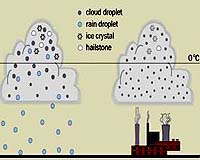| . |  |
. |
Stockholm (AFP) Aug 23, 2009 By rethinking the humble toilet, Indian sanitation expert Bindeshwar Pathak has found a way that can save water -- and lives -- in developing countries. For four decades, His Sulabh Sanitation Movement has equipped more than 1.2 million households with eco-friendly toilets and installed 7,500 public lavatories across India. Yet almost three out of four Indians, or around 700 million people, still have no access to basic sanitation. This leads to up to half a million deaths each year, Pathak, 66, told AFP at the World Water Week conference in Stockholm, where he was awarded this year's Stockholm Water Prize for his groundbreaking work. To lower the risk to human health, Pathak developed a twin-pit, pour-flush toilet known as the Sulabh, that uses a pair of tanks to store waste matter with no smell or soil pollution, pending recycling as fertiliser. It uses significantly less water than a standard toilet, Pathak said. "It requires only 1.0 to 1.5 liters to flush instead of 10 liters," he said. "It saves trillions of litres of water each year." The idea is to discourage both open-air defecation and the use of bucket toilets -- options that ramp up the risk of the spread of disease and diarrhoea. "People have died of cholera cleaning the bucket toilets," Pathak explained. When a Sulabh is sold to households, its price is adjusted according to a family's ability to pay. The poorest families pay 15 dollars (10 euros) whereas richer families can be asked to pay up to 1,000 dollars. The Sulabh Sanitation Movement's campaign to raise awareness of health issues has also seen more and more Indians prepared to pay user charges for its 7,500 public toilets. Staffed 24 hours a day, they cost one dollar a month to use them by subscription -- with an exemption for slum dwellers, women and children. "For the whole month, you can go to the toilet, you can have a bath, you can drink water," Pathak said. The Sulabh has been exported to Afghanistan and Bhutan, and there are also plans to ship some to 15 other countries, most of them in Africa. "I feel very happy because what we have been doing for the last 40 years, now it feels that we are going in the right direction," Pathak told AFP. As the winner of the Stockholm Water Prize, Pathak receives a cheque for 150,000 dollars (104,700 euros) in recognition of his work to conserve water and improve public health. Share This Article With Planet Earth
Related Links Water News - Science, Technology and Politics
 Pollution In Eastern China Cuts Light, Useful Rainfall
Pollution In Eastern China Cuts Light, Useful RainfallRichland WA (SPX) Aug 21, 2009 New research shows that air pollution in eastern China has reduced the amount of light rainfall over the past 50 years and decreased by 23 percent the number of days of light rain in the eastern half of the country. The results suggest that bad air quality might be affecting the country's ability to raise crops as well as contributing to health and environmental problems. The study links ... read more |
|
| The content herein, unless otherwise known to be public domain, are Copyright 1995-2009 - SpaceDaily. AFP and UPI Wire Stories are copyright Agence France-Presse and United Press International. ESA Portal Reports are copyright European Space Agency. All NASA sourced material is public domain. Additional copyrights may apply in whole or part to other bona fide parties. Advertising does not imply endorsement,agreement or approval of any opinions, statements or information provided by SpaceDaily on any Web page published or hosted by SpaceDaily. Privacy Statement |